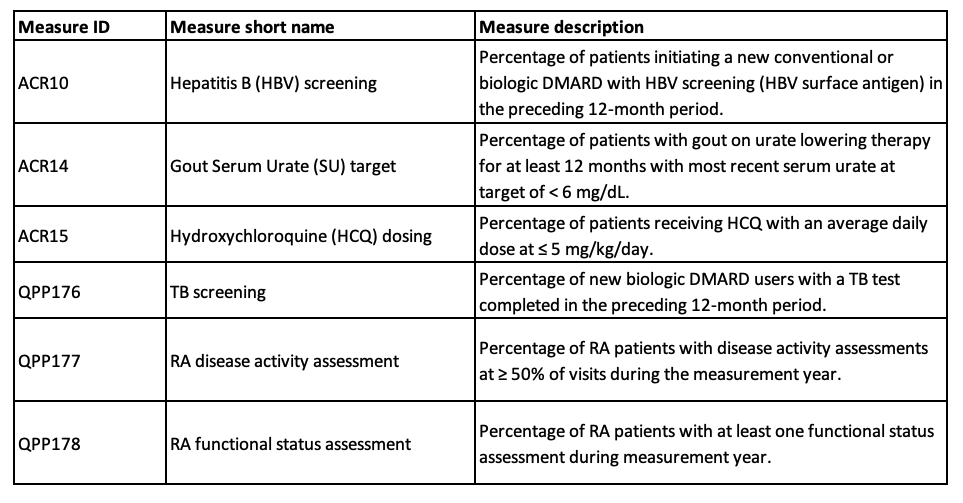Session Information
Date: Sunday, October 26, 2025
Title: (0210–0232) Measures & Measurement of Healthcare Quality Poster I
Session Type: Poster Session A
Session Time: 10:30AM-12:30PM
Background/Purpose: Previous studies have shown that quality measure performance tends to improve after practices join the ACR’s Rheumatology Informatics System for Effectiveness (RISE) registry, but the underlying drivers of this improvement remain unclear. One potential factor is access to the RISE web-based clinician dashboard, which provides detailed performance data to support quality improvement. Although many practices access the dashboard, its impact on quality improvement is not well understood. This study evaluated whether year-over-year changes in dashboard engagement were associated with changes in performance on 6 rheumatology-specific quality measures.
Methods: We included practices that reported any of the 6 selected measures in both 2021 and 2022. Included measures are shown in Table 1. Using audit log data, dashboard engagement was categorized into 4 levels: Most engaged: ≥2 sessions/month and ≥1 measure-action/month for ≥6 months; Moderately engaged: Some sessions and measure-actions, but below “most” threshold; Minimally engaged: >1 session, 0 actions; No engagement: 0 – 1 session, no actions. Practices were classified based on change in engagement level from 2021 to 2022 (increased, decreased, or no change). For each measure, we calculated performance change and visualized differences across engagement change groups using box plots. Analyses were stratified by baseline performance (above or below the 2021 median). We conducted linear regression analyses to test the association between engagement change and performance change, adjusting for baseline performance, EHR vendor, and an interaction term between engagement change and baseline performance.
Results: Among the 181 practices, most were single-specialty groups, and nearly half used the NextGen EHR (Table 2). At baseline, 13% were most engaged, 44% were moderately engaged, 23% were minimally engaged, and 20% had no dashboard engagement. Between 2021 and 2022, 57% of practices had no change in engagement, 26% decreased, and 17% increased. Practices that increased their engagement showed greater improvements in performance on certain measures, specifically HBV safety screening, gout serum urate (SU) target, and HCQ dosing (Figure). These effects were most evident among practices with below-median baseline performance. Linear regression results aligned with these findings, showing increased engagement to be associated with greater improvements in gout and HCQ measures, although these associations did not reach statistical significance.
Conclusion: Increased engagement with the RISE dashboard from one year to the next was associated with modest performance gains in selected rheumatology quality measures. Prior studies have shown steady improvements in multiple measures after practices join the registry, and these findings suggest that greater use of the dashboard may support quality improvement efforts, especially among lower-performing practices. Additional studies with larger sample sizes are needed to clarify causal pathways and identify strategies to maximize the dashboard’s impact on clinical performance.
 Table 1. Rheumatology-specific measures included in this study
Table 1. Rheumatology-specific measures included in this study
.jpg) Figure. Distribution of performance change in percentage points (pp) by quality measure and 2021 performance above vs. below the median
Figure. Distribution of performance change in percentage points (pp) by quality measure and 2021 performance above vs. below the median
.jpg) Table 2. Characteristics of included RISE practices, according to change in engagement with the RISE clinician dashboard from 2021 to 2022
Table 2. Characteristics of included RISE practices, according to change in engagement with the RISE clinician dashboard from 2021 to 2022
To cite this abstract in AMA style:
Li J, Fitzpatrick J, Yazdany J, Schmajuk g. Increased Engagement With the RISE Registry Clinician Dashboard Is Associated With Improving Performance on Some but Not All Rheumatology Quality Measures [abstract]. Arthritis Rheumatol. 2025; 77 (suppl 9). https://acrabstracts.org/abstract/increased-engagement-with-the-rise-registry-clinician-dashboard-is-associated-with-improving-performance-on-some-but-not-all-rheumatology-quality-measures/. Accessed .« Back to ACR Convergence 2025
ACR Meeting Abstracts - https://acrabstracts.org/abstract/increased-engagement-with-the-rise-registry-clinician-dashboard-is-associated-with-improving-performance-on-some-but-not-all-rheumatology-quality-measures/
